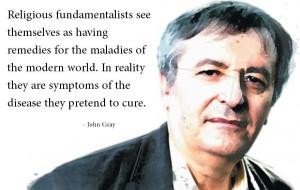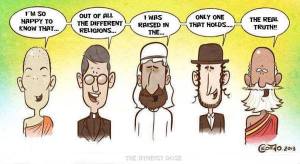I have a mantra on life that I wish to share with you, dear reader. Ignorance restricts and breeds hatred and extremism; while knowledge liberates, and breeds compassion and understanding. Fundamentalism stems from ignorance, and thus only breeds negativity. It is a venomous disease that kills positivity and growth, and needs to be identified and cured, on a very personal level.
As a Muslim, who in his earlier days had adopted quite a fundamentalist approach, I have come a long way by internalizing a basic yet painful truth: I definitely do not have all the answers, hence different point of views are not only necessary for my own growth and evolution (which to me, is the prime purpose of life) but also that respecting diversity is the only solution of progress and co-existence. I have come to realize that only those who hold a shallow outlook are afraid of diversity in thought, for it threatens ungrounded and un-researched prejudices and beliefs. Bertrand Russell, very wisely, puts it as:
“The whole problem with the world is that fools and fanatics are always so certain of themselves, and wiser people so full of doubts.”
- Lack of independent study and exposure to different schools of thought
In my humble opinion, the biggest factor of fundamentalism and dogmatism is that most people do not critically examine the philosophy on life they profess to accept and believe in. Naively believing whatever is told to them by their family/friends and scholars, they lack the exposure to different schools of thought that has the tendency of humbling one’s self down. So, when a blind belief is threatened by an opposing point of view, such people, unable to prove their point by reasoning, resort to insults and bad language; or in extreme cases, resort to violence in order to protect that belief and to gain a feeling of supremacy and self-worth. This, in medical terms, is also known as cognitive dissonance.
- Inconsistency in approach
Whether it be theism or atheism, dogmatism and fundamentalism exists on both sides of the coin. This is a bitter truth that I’ve observed over the years. One would expect atheists and “progressive religionists” to be more open-minded towards those who differ from their perspective, but this unfortunately is not the case with all of them. Ironically, they become what they detest the most: hardliner preachers of their “religion”, looking down upon anyone and everyone who differs. Of course, I do not mean to imply that every atheist or theist behaves like that, which brings me to my next point: avoiding generalizations.
- Generalizations and thinking in absolutes
Generalizations play a key role in fundamentalism and dogmatism: All Muslims are terrorists. All atheists are proud and arrogant. All Shias are Kafirs. Every black person is a thug; every white person a racist. Fundamentalists perceive everything in a black and white manner, refusing – or simply uninterested- to observe the many shades of grey within. This, again, brings me back to my point: exposure! The more you are exposed to a diversity of people: their way of living, their way of thinking, their way of worshiping (or the lack thereof), the more you broaden your mind and cease thinking in absolutes.
- Possessing the key to “the sole truth”
Religionists are brought up believing that their path to God is the “only” correct path worthy of salvation, and this brainwashing turns some (if not most) of them into bigots. Atheists believe that atheism is the “only” rational approach, and this brainwashing turns some (if not most) of them into bigots. What needs to be eliminated is the personal belief of having a monopoly on truth, even the idea of there being a sole truth out there. But it’s challenging – it’s challenging because having a monopoly on truth and looking down upon others is a great boost for the ego and a major source of self-worth for some. In addition, this feeling of superiority due to having the key to “the truth” may well be the most defining part of their personality, making it even harder for them to abolish this self-centered belief.
However, sincere people in all walks of life eventually realize the need for pluralism and tolerance. A sincere person analyzes the contradictions in his own approach and works on continually reforming himself, instead of always finding faults with others. A sincere person strives for consistency in approach. If he detests something in others, he makes it incumbent upon himself that that negative trait is not a part of his own personality. And when he does this, he automatically becomes more tolerant, more compassionate, more humble, and above all, he is able to acquire peace within himself which ultimately is the prime purpose of any philosophy on life. All in all, he is more interested in his own evolution instead of proving others wrong.
As Gandhi said, be the change you wish to see in the world!
Related article: United Sects of Islam: A different perspective on unity and sectarianism
*If you liked this post, please help us spread the word by sharing it on your social networks!
Please subscribe to our blog by clicking the “follow” button (Top right – PC) and (Bottom – Cell phone/Tablet).
And please like our Facebook Page: http://www.facebook.com/quranalyzeit






Reblogged this on Teddy3indc – No Quotes, Just Me (mostly).
LikeLike
I agree on most of what you have written, though here’s a bit of (hopefully) constructive criticism. When you write:
“I definitely do not have all the answers, hence different point of views are not only necessary for my own growth and evolution (which to me, is the prime purpose of life) but also that respecting diversity is the only solution of progress and co-existence.”
this and the general tone of the post almost comes across as a bit apologetic. I personally would never make my belief system one which I need to apologize for, and wouldn’t want anyone else to either; such a belief system should be chucked by the wayside.
Those of us who have attained faith through reason understand that the principles of humbleness, diversity, and common brotherhood/sisterhood (the ummah) are enshrined in laws detailed in the Qur’an. We ought to have no need to go outside the Qur’an to find strong defense and promotion of human rights and evolution of human civility. This is not to say that we shouldn’t be exposed to other peoples/cultures/religions, only that it would have been nice if some Qur’anic verses were also used to support the principles being considered.
In my understanding we can both not compromise on being a witness to the truth God has given all of us and be living examples of moderation, humbleness and exercising a balanced approach in life.
So going back to the quote above, yes we most certainly do not have all the answers, but I will not shy away from stating with confidence that the Qur’an surely does as it was authored by none other than God. To the extent I fail to implement those answers in my life is only my fault and of no one else.
LikeLike
Salaam Namaan.Thank you for your comment.
I am not able to understand how that paragraph sounds apologetic to you, since it is only calling for broad-mindedness on part of religionists. When did I apologize for my belief system? I did not want to load this piece with quranic verses because I’ve already written such a piece here:
https://quranalyzeit.wordpress.com/2014/02/28/united-sects-of-islam-a-different-perspective-on-unity-and-sectarianism/
LikeLike
Right, I did enjoy that post. I should’ve added in my previous comment that I recognize that it really just depends on how you’re trying to present your thoughts so please don’t take my comment harshly. I just feel that a part of staying balanced for me personally has meant to not be afraid of shying away from stating my belief in God in the face of an increasingly atheistic/spiritual backdrop where such profession sounds almost antiquated.
Keep up the good work 🙂
LikeLike
No, of course not. I do understand your point of view. It did not include verses as this was a piece I did for a blog channel which doesn’t allow verses inside blogs as per their policy.
Thank you. 🙂
LikeLike
Important reflections. More of this, please. 🙂
LikeLike
Hey! 🙂
Here:
https://quranalyzeit.wordpress.com/2014/02/28/united-sects-of-islam-a-different-perspective-on-unity-and-sectarianism/
https://quranalyzeit.wordpress.com/2013/12/14/stages-of-consciousness-in-a-believer/
LikeLike
Bowing thankful. 🙂
LikeLike
Pleasure Salva 🙂
LikeLike